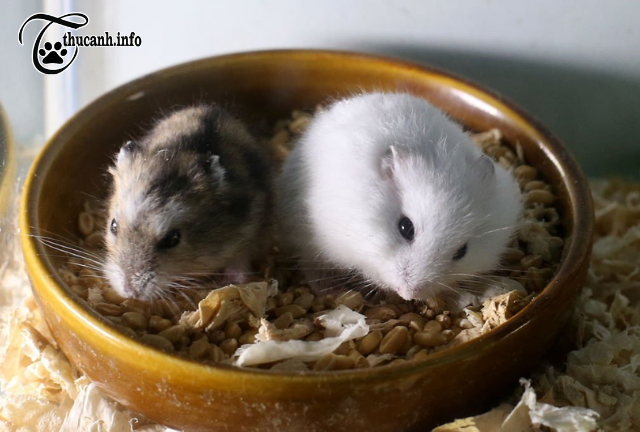Why is your Hamsters eat so much? In this article, thucanh.info will explore the top reasons behind your furry friend’s growing appetite and learn how to help them achieve a healthy diet and lifestyle. for a longer, happier life
1. Why is my hamsters eating so much?
Your hamster is an enthusiastic eater, and his next meal may be the highlight of his day. With high metabolic requirements, hamsters find themselves chewing through 10 percent of their body weight in food every 24 hours.

5 Reasons Why Your Hamster May be Overeating
2. Reasons Why Your Hamster Might Be Overeating
Now that we know what is considered normal eating for hamsters let’s explore some of the reasons why your hamster might be overeating.
2.1 Obesity
One of the most common reasons why hamsters overeat is obesity. If your hamster is consuming too many calories and not getting enough exercise, they will likely gain weight quickly. This can lead to a number of health issues, including diabetes, heart disease, and joint problems.
2.2 Boredom
Hamsters are active creatures that need plenty of mental and physical stimulation to stay healthy and happy. If your hamster is bored, they may turn to food as a way to pass the time. Providing your hamster with plenty of toys and activities can help reduce boredom and prevent overeating.
2.3 Health Issues
Sometimes, overeating can be a sign of an underlying health issue. If your hamster is consuming more food than usual and is also displaying other symptoms such as lethargy, diarrhea, or changes in behavior, it’s important to seek veterinary care.
2.4 Pregnancy
If you have a female hamster, overeating may be a sign that she is pregnant. Pregnant hamsters need extra calories to support the growth and development of their offspring.
3. Common Causes of Excessive Eating in Hamsters

The 7 Surprising Factors That Could be Causing Your Hamster to Overeat
Why is my hamsters eating so much? Hamsters are known for their voracious appetites, but when they start eating excessively, it may indicate an underlying issue. Understanding the reasons behind your hamster’s increased food consumption is crucial in ensuring their health and well-being.
One possible cause of excessive eating is a lack of proper diet and nutrition. Hamsters require a balanced diet that consists of high-quality hamster pellets, fresh fruits, and vegetables. If their diet lacks essential nutrients, they may compensate by eating more.
Stress and anxiety can also lead to increased food intake in hamsters. Changes in their environment, such as loud noises, frequent handling, or the presence of predators, can trigger stress. This, in turn, may result in overeating as a coping mechanism.
3.1 Diet and Nutritional Needs
To address the issue of excessive eating, it’s essential to evaluate your hamster’s diet and nutritional needs. Ensure they are receiving a well-rounded diet that meets their specific requirements. Consult with a veterinarian or a knowledgeable pet store employee to determine the best food options for your hamster.
Offering a variety of foods can help satisfy their nutritional needs and prevent overeating. Incorporate fresh fruits and vegetables into their diet, but be mindful of portion sizes to avoid excessive calorie intake. Monitor their weight regularly to ensure they maintain a healthy body condition.
3.2 Stress and Anxiety
Excessive eating in hamsters can be a response to stress and anxiety. Create a calm and secure environment for your hamster by providing a quiet and comfortable living space. Avoid sudden changes in their surroundings and handle them gently to minimize stress.
Engaging your hamster in enriching activities can help alleviate stress and reduce excessive eating. Provide toys, tunnels, and exercise wheels to keep them mentally and physically stimulated. Spending quality time interacting with your hamster through gentle play or training sessions can also help alleviate anxiety.
4. Addressing Excessive Eating in Hamsters
Excessive eating in hamsters can be a cause for concern, as it may indicate an underlying problem. By addressing this issue promptly, you can ensure the health and well-being of your furry friend.
4.1 Portion Control and Feeding Schedule
- Status: Proper portion control plays a crucial role in managing your hamster’s food intake. It’s essential to provide them with the right amount of food to maintain a healthy weight. Overfeeding can lead to obesity and various health issues.
- Reason: Establishing a regular feeding schedule is equally important. Consistency in feeding times helps regulate your hamster’s eating habits and prevents them from constantly seeking food. This also allows you to monitor their food consumption more effectively.
- Note: To determine appropriate portion sizes, consider factors such as your hamster’s age, size, and activity level. Consult with a veterinarian or do thorough research to ensure you’re providing the right amount of food for your hamster’s specific needs.

Why Your Hamster is Overeating: A Comprehensive Guide with 10 Solutions
4.2 Seeking Veterinary Advice
- Status: If your hamster’s excessive eating persists despite implementing portion control and a feeding schedule, it’s advisable to seek veterinary advice. A veterinarian can evaluate your hamster’s overall health and conduct further examinations to identify any underlying health conditions.
- Reason: Excessive eating can be a symptom of various medical issues, including hormonal imbalances, diabetes, or gastrointestinal problems. By consulting a veterinarian, you can rule out these potential causes and receive appropriate guidance for further diagnosis and treatment.
- Advice: Remember that a veterinarian is a trusted source of information and expertise when it comes to your hamster’s health. They can provide personalized recommendations based on your hamster’s specific needs and help you address any concerns related to their excessive eating.
Note: By practicing portion control, establishing a feeding schedule, and seeking veterinary advice when necessary, you can effectively address excessive eating in your hamster and ensure their overall well-being.
5. What Can You Do About It?
If you have noticed that your hamster is overeating, there are several things you can do to help them get back on track.

From Portion Control to Exercise: 6 Tips to Help Your Hamster Stop Overeating
5.1 Adjust Their Diet
The first step is to take a closer look at what you are feeding your hamster. Make sure they are getting a balanced diet that includes high-quality pellets, fresh vegetables, and limited amounts of fruit.
5.2 Provide Toys and Activities
To prevent boredom, make sure your hamster has plenty of toys, exercise wheels, and other activities to keep them entertained. This will not only reduce overeating but will also improve their overall quality of life.
5.3 Monitor Their Health
If you suspect that your hamster’s overeating is due to an underlying health issue, it’s important to seek veterinary care. A professional can help diagnose any potential issues and provide the necessary treatment to get your hamster back on track.
5.4 Limit Treats
While it’s important to provide your hamster with treats occasionally, it’s essential to limit their intake. Too many treats can lead to weight gain and other health issues.
6. FAQs
Q1: How much should I feed my hamster?
A1: In general, hamsters should eat around 10-15 grams of food per day. However, this amount can vary based on their age, weight, and activity level.
Q2: Can hamsters overeat?
A2: Yes, hamsters can overeat for a variety of reasons, including boredom, obesity, health issues, and pregnancy.
Q3: What should I do if my hamster is overeating?
A3: If you notice that your hamster is overeating, adjust their diet, provide plenty of toys and activities, monitor their health, and limit treats.
Q4: What should I feed my hamster?
A4: A balanced diet for hamsters should include high-quality pellets, fresh vegetables, limited amounts of fruit, and clean water.
Q5: Why is my hamster eating so much?
A5: There are several reasons why a hamster might be overeating, including boredom, obesity, health issues, and pregnancy.
7. Conclusion
The above article, thucanh.info helped you understand why is my hamsters eating so much. By identifying the underlying causes and addressing them through proper diet, nutrition, and monitoring, you can help your hamster maintain healthy and balanced eating habits. Remember to consult your veterinarian if you are concerned or if overeating persists. With your care and attention, you can ensure that your hamster has a happy and fulfilling life.


